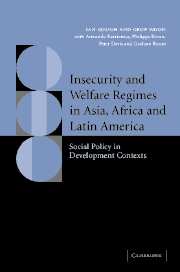 Insecurity and Welfare Regimes in Asia, Africa and Latin America
Insecurity and Welfare Regimes in Asia, Africa and Latin America Book contents
- Frontmatter
- Contents
- List of maps
- List of figures
- List of tables
- List of authors
- Acknowledgements
- List of abbreviations
- Glossary
- Introduction
- Part I Understanding insecurity and welfare regimes in the South: an analytical framework
- Part II Regional regimes
- Part III Regimes in global context
- 7 Rethinking the welfare regime approach in the context of Bangladesh
- 8 Multi-tiered international welfare systems
- Conclusion : Rethinking social policy in development contexts
- References
- Index
7 - Rethinking the welfare regime approach in the context of Bangladesh
Published online by Cambridge University Press: 04 August 2010
- Frontmatter
- Contents
- List of maps
- List of figures
- List of tables
- List of authors
- Acknowledgements
- List of abbreviations
- Glossary
- Introduction
- Part I Understanding insecurity and welfare regimes in the South: an analytical framework
- Part II Regional regimes
- Part III Regimes in global context
- 7 Rethinking the welfare regime approach in the context of Bangladesh
- 8 Multi-tiered international welfare systems
- Conclusion : Rethinking social policy in development contexts
- References
- Index
Summary
Introduction
The study of welfare regimes in ‘developed countries’ has proved to be a particularly useful tool in understanding the connecting logic underlying different attributes of welfare states. Over the last decade the approach has generated a wide literature within the field of social policy and formed the basis for conceptual schemas used in empirical research examining the dynamic relationship between societal values, group interests and emerging welfare systems (Esping-Andersen 1999; Goodin et al. 1999). It has also generated its own share of criticism (Castles and Mitchell 1993; O'Connor, Orloff and Shaver 1999; Room 2000a).
However, the approach has rarely been applied in developing contexts. This chapter explores welfare regime theory using the case of Bangladesh to highlight its strengths and weaknesses in a wider context. I begin by summarising the relevant features of the welfare regime approach for such a task. I then reflect on the usefulness of these for the Bangladesh context, exploring the strengths and weaknesses of the conceptual apparatus in such a setting. My approach is sympathetic to the overall dynamic and political economy focus of the original welfare regime approach, especially due to their relative neglect in current development discourse. The chapter also aims to use the Bangladesh experience to contribute to a wider discussion on more broadly applicable schemas for understanding and analysing social policy in a less state-centric way so as to be relevant in developing contexts.
- Type
- Chapter
- Information
- Insecurity and Welfare Regimes in Asia, Africa and Latin AmericaSocial Policy in Development Contexts, pp. 255 - 286Publisher: Cambridge University PressPrint publication year: 2004
- 2
- Cited by


